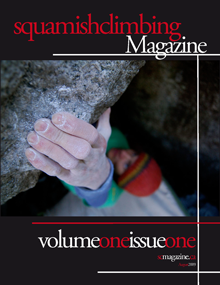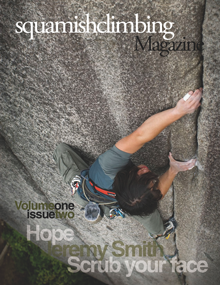The 2016 Vancouver International Film Festival is just around the corner and Squamish Climbing Magazine is more than excited to be a part of it. The film festival has long been an event that brings the climbing community together to celebrate the virtue of adventure and this year is no exception. With any event of this magnitude, it simply doesn’t put on itself. Behind the scenes there are cogs and gears moving long before any of the films hit the screen. From volunteers to directors, people are dedicating hours and hours to making the festival happen.
One of those people who has taken on a pretty big role over the past six years in bringing the festival together is Tom Wright. Tom Wright spent the first 20 years of his life living a typical middle class English life. A life changing year studying in Montreal introduced him to rock climbing, snowboarding and Canadians – all of which he loved immediately! A natural move out West followed and for the past 7 years Tom has immersed himself in the coast mountain culture. He now lives in Squamish with his girlfriend Vikki and their dog Tundra. His official title at VIMFF is the Director of Film and Programming but he is also the guy who is there every night trying to make sure that things run smoothly. We thought it would be a great idea to interview Tom and get his thoughts on the festival this year and some of the highlights he is looking forward to.
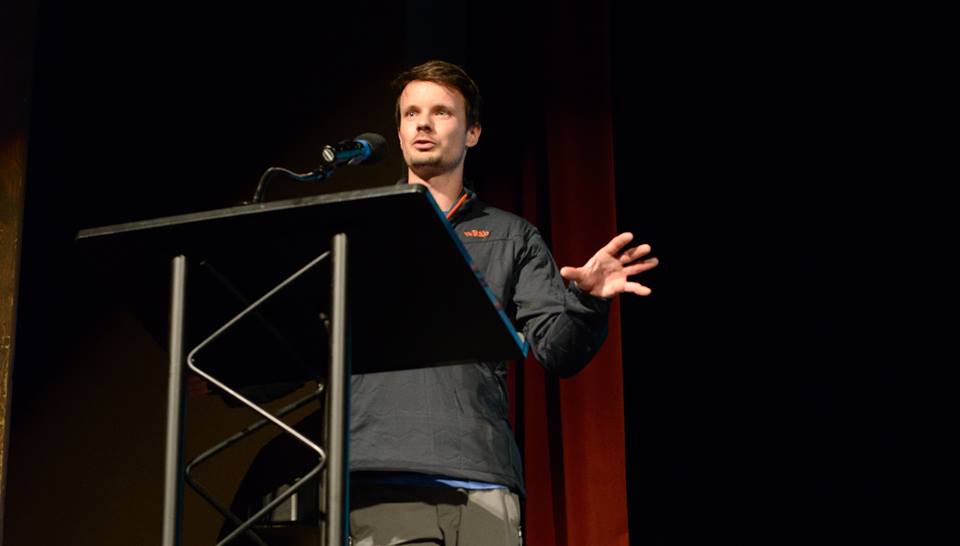
Tom Wright on the VIMFF stage. Photo courtesy of VIMFF ©
Hi Tom, thanks for taking the time to answer a few questions. How are things going?
Hi Tim, thanks for getting in touch. Things are ramping up here with the festival less than two weeks away.
The 2016 Vancouver International Film Festival kicks off on Friday, February 12th. What is in store for this year’s festival?
Climbing has always been at the heart of the festival, and although these days we have a very diverse program covering all aspects of mountain sports and culture I think it’s fair to say that climbing still takes centre stage. We have at least 10 events in the program this year that climbers will be interested in – some of the biggest names in climbing are coming to Vancouver such as Kevin Jorgeson and Lynn Hill, and you can see climbing films from around the world that you would never get the chance to see elsewhere.
Personally, I am most excited to see Leo Houlding take the stage at VIMFF for the first time – he is one of my biggest heroes in climbing.
It will be pretty exciting to finish the festival with Leo Holding. When did you first get really psyched on Leo?
I’ve always been a fan of the way Leo goes about things – his ground up free climbing efforts on El Cap are mega inspiring to me personally, and his more adventurous expeditions to far flung places have always been popular on the big screen at VIMFF. I think we’re in for a real treat this year at VIMFF – Leo’s enthusiasm is infectious.
I want to get a little insight into your role. How long have you been a part of the festival and how did you get involved?
I think this is my sixth year working with VIMFF – I started out as a keen volunteer, working backstage one year and then an opening came up managing the film competition. It’s evolved from there.
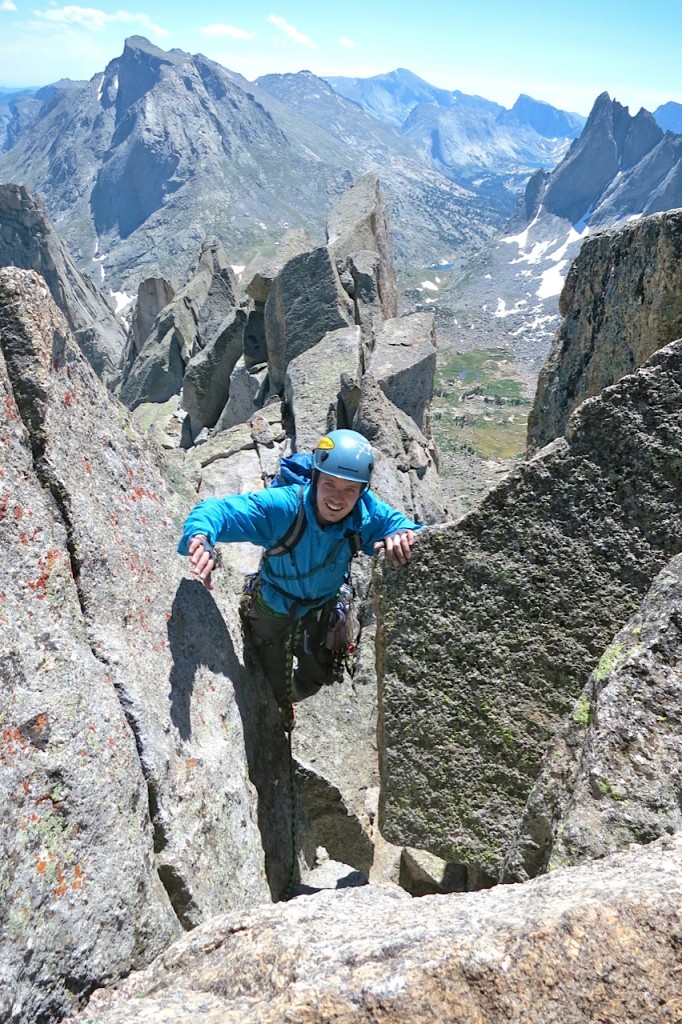
Tom climbing in the Wind River range. Photo by Vikki Weldon ©
You and Alan (Formanek) really seem to be working together to bring the festival together. How do you and Alan go about planning the festival and everything in-between?
Lots of coffee shop meetings! I would say that the festival comes together organically as we progress through the year – we have a rough idea of some big name speakers we’d like to bring, but mostly we tap into strong themes from the films or from trends and patterns in outdoor culture. For example, this year we have our first show on Slacklining, which has exploded in recent years – hopefully we can pull together enough programming to make this event happen every year.
How do you pick the films and speakers for the event?
We have a great relationship with other mountain festivals and they are a great place to meet filmmakers and potential guest speakers for VIMFF.
My job is to generate submissions for the festival and then we have a film selection panel and pre-screeners who help review films and select finalists. We always have a hit-list of ‘big-name’ speakers to approach, some of these work out and some don’t. Many of our guest speakers are local, living in the Sea-to-Sky region – we have some world class adventurers, athletes and filmmakers who call this place home.
You must see a lot of films! How do you stay motivated for each film?
Yes I’ve literally seen thousands of adventure films in the last few years, and I still get just as inspired by the good ones – for me, adventure films, and especially climbing films, are the best way to generate enthusiasm for adventure and climbing in real life.
The festival takes a lot of organization and preparation. Do you get nervous as time ticks down for the season?
Of course, I think its natural with any events, especially ones that take a lot of planning. But it eases every year as you become more dialed and you learn from previous mistakes.There are always things you can’t account for though. Maybe some people remember a show a couple of years back – Nina Caprez’ presentation at the RIO – there was a power cut and no backup generator in place – everyone had to leave in the dark! Pretty much my biggest nightmare, and one that I hadn’t even considered before. I hope that doesn’t happen again!
You have watched all the films. are there any that really stuck with you despite perhaps not being a crowd favourite?
There is a film this year called TOM, this is its first showing in North America and it’s likely most people over here haven’t heard of the film or its main protagonist. The film follows Tom Ballard as he attempts to solo the famous six north faces of the Alps in one winter season. It’s a very personal story about a down-to-earth climber with ambitious goals. It shows that you don’t need fancy sponsors to be on the cutting edge!
If you had to pick three films to see this year, what would they be?
There are a few for sure but if I had to pick three:
Operation Moffat takes inspiration and wit from the colourful climbing life of Britian’s First Female Mountain Guide Gwen Moffat. Writer Claire Carter and Filmmaker Jen Randall scramble, swim and barefoot climb through Gwen’s most cherished British landscapes, grappling with her preference for mountains over people, adventure over security, wilderness over tick lists. With new take on landscape photography, archive footage and action sequences this is a film rooted in a real love of wild places.
Dubbed ‘The Mountain God’, the Citadel is a stunning 3000m peak in one of the remaining untouched corners of the Great Alaskan Range: The Neacola Mountains which due to their typically poor conditions and remote location are largely unexplored. The Citadel is beautiful but deadly, plagued by bad weather and prone to avalanche.
Is there any common thread with all these films that really shows for you as you watch every film?
If pressed, I would say that the narrative and personalities in mountain films are the most important aspects. ‘Operation Moffat’ definitely has a strong character and an intriguing back story. Films that approach a new narrative in mountain culture always stand out, and K2 Touching the Sky does exactly this – the rare perspective of the children of alpinists who have died in the mountains. Top quality imagery definitely doesn’t hurt though, and Citadel is the first alpine climbing film shot in 4k – Alastair Lee took the Cineflex deep into Alaska and the results are incredible.
Does seeing all the films let you see the culture of climbing in a different light?
I don’t think the films make me see climbing culture in a ‘different light’ necessarily but they definitely help me understand its many levels – one of the reasons I love climbing so much is its diversity – in the pursuits, (bouldering, trad climbing, alpine climbing etc), in different locations around the world and in the people you meet along the way. The culture of climbing also changes with all of these factors – but a few things remain constant. The mental and physical challenges and the notion of exploration and adventure – whether that be putting up a new boulder problem in the local forest or travelling to unexplored regions of the Karakorum. The films and presentations at VIMFF delve into all of these different aspects of climbing culture.
The speaker line-up is impressive this year. Do you have a hand in this or is it mostly Alan who puts these together?
It’s probably around 50/50. Alan’s been running mountain festivals around the world for almost 20 years now, his network of speakers and filmmakers is impressive and is a massive asset for the VIMFF. For some of the sports I am not as actively involved in, such as Mountain Biking and Trail Running we have key members of those communities help out with programming – Sieneke Toering and Ean Jackson have been crucial to the success of those shows in the last few years.
What are you looking forward to the most as we enter the festival season?
Well by the time the festival rolls around I’ve seen the films around 4 or 5 times each. I still get excited for the presentations but when the films are playing I can often be found in the lobby having a beer with old friends.
Thanks for chatting with us Tom. I have watched you watching some of the films this year and I am sure the event will be a great success. We are really looking forward to being a part of it.
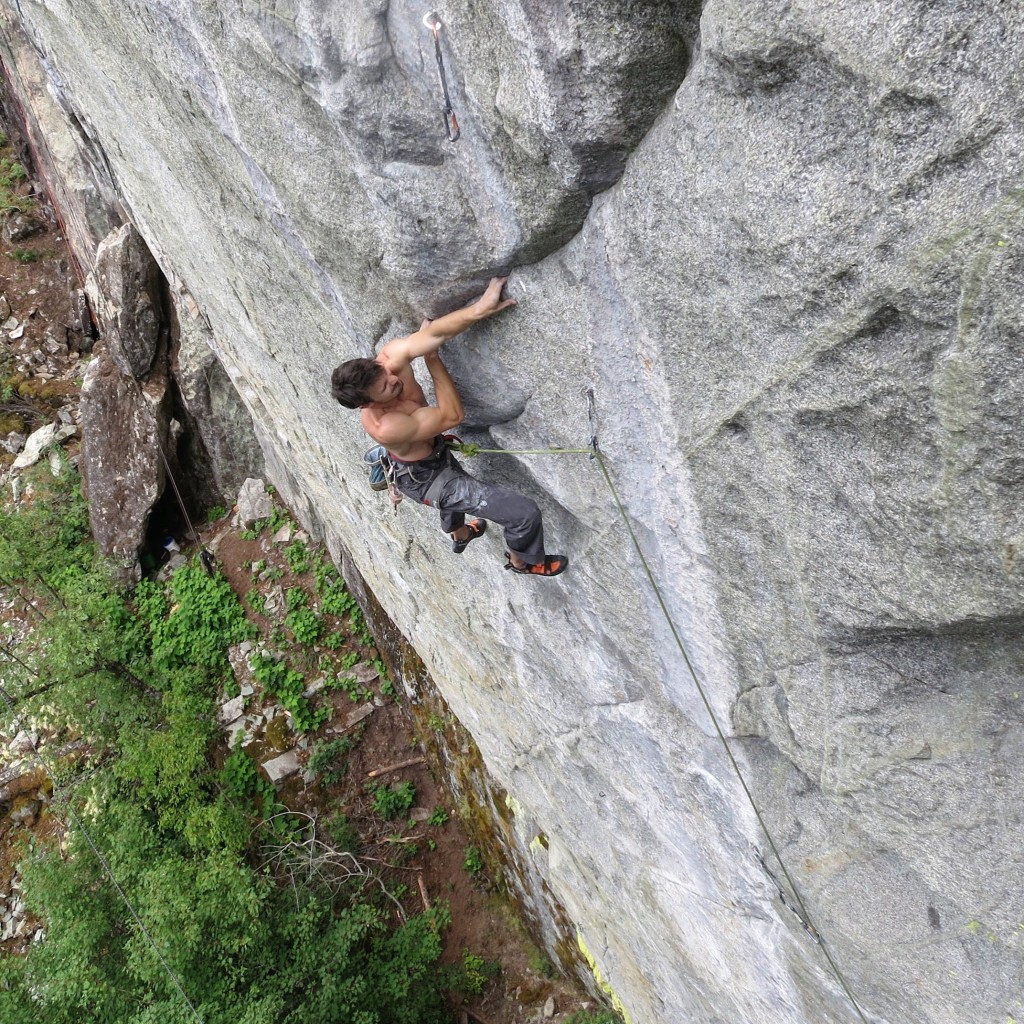
Tom Wright on his fA Spirit of the West (5.14.a). Photo by Vikki Weldon
The 2016 Vancouver International Film Festival starts Feb. 12th, 2016 and runs until Feb. 19th. For information about the schedule or to purchase tickets, please visit the VIMFF website.












